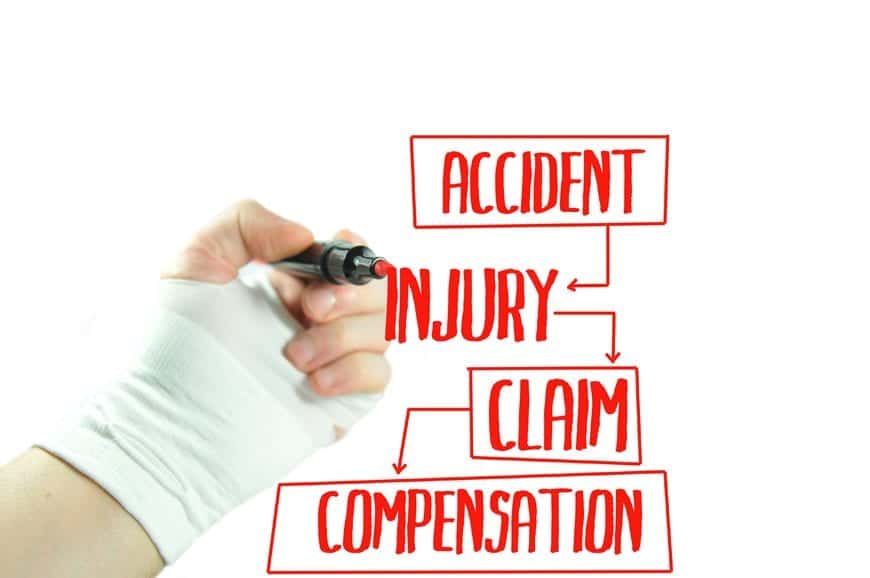When a noncustodial parent receives personal injury settlement do not assume the settlement funds are not income for purposes of child support. In a recent Illinois appellate decision the court found the net proceeds from a noncustodial parent’s personal injury settlement as income for child support purposes.
Personal Injury Settlement: Damages for Pain and Suffering and Disability Relevant to Child Support?
Larry and Cara received a judgment of dissolution in Texas. As part of that judgment, Cara was awarded the majority of parenting time with the parties’ minor child, and Larry was ordered to pay child support. After the divorce, Cara and the minor child moved to Illinois and Larry moved to Nebraska.
A year later, Cara went back to school and she reached an agreement with Larry to take custody of their child. They agreed that she wouldn’t pay child support because she was a student. In March 2015, Larry filed a petition to set child support, as Cara was no longer a student. During the course of discovery, Larry received information that Cara had recently received a personal injury settlement.
Net Proceeds from a Personal Injury Settlement Attributable to Damages for Pain and Suffering and Disability is Income for Child Support Purposes
In June 2016, the trial court held a hearing on Larry’s petition to set child support. In part, Cara testified she received a personal injury settlement after a car accident that resulted in her sustaining four broken ribs, a broken left wrist, and injuries to her leg. After deducting attorney fees and other expenses, Cara received a net amount of $158, 972.77. That money, Cara testified, was for her pain and suffering and not loss of income. When asked for her basis for concluding the money related to only pain and suffering, Cara testified: “Because I—it took a long time for my wrist to heal. I’m a massage therapist. I couldn’t work. I couldn’t do anything. I couldn’t drive a whole lot, you know. I was on pain medication.”
Cara testified she used the money from the settlement to purchase a house, purchase a vehicle for herself, purchase a vehicle for an ex-boyfriend, and pay debt and various legal expenses, including fees for mediation and the services of a guardian ad litem. Cara testified she also used the money to purchase clothing and other items for their child when he visited. At the time of the hearing, the money from the personal injury settlement was gone.
Larry requested the trial court consider the entirety of the net proceeds from Cara’s personal injury settlement as income for the purpose of setting child support. Larry argued that the supreme court’s subsequent decision in In re Marriage of Rogers, 213 Ill. 2d 129, 136, 820 N.E.2d 386, 390 (2004), set forth an expansive definition of income, which would include the entirety of the net proceeds from a personal injury settlement as those proceeds amount to a gain to the recipient. Larry further asserted the evidence demonstrated Cara used the money from her settlement as if it was income.
Cara requested the trial court not consider any part of her personal injury settlement as income for the purpose of setting child support. Cara suggested the court should find that monies she received for pain and suffering should not be considered as income because it is intended to compensate the injured party. Her argument was essentially that the monies weren’t to pay her back because she couldn’t work (lost wages), but it was to compensate her for the pain and suffering she received in the accident.
Trial Court Decision
After considering the evidence and arguments presented, the trial court declined to consider any portion of Cara’s personal injury settlement as income for the purpose of setting child support. The court rejected Larry’s argument suggesting the entirety of the net proceeds of a personal injury settlement was income for child support purposes. The court stated that only those damages attributable to lost earnings is income for child support purposes. The court also rejected Larry’s alternative argument that it should consider the portion of Cara’s personal injury settlement attributable to lost earnings as income, finding, based on the evidence presented, it was unable to determine how much of the settlement was in fact attributed to lost earnings. In rejecting Larry’s alternative argument, the court further declined Larry’s request to allow him to conduct further discovery on the breakdown of Cara’s personal injury settlement.
The court set temporary child support and continued the matter to set permanent child support. Based on the evidence of Cara’s recent employment, the court set permanent child support and an arrearage. As to the motion to reconsider, the court denied Larry’s request for it to consider the entirety of the net proceeds from a personal injury settlement as income for child support purposes. However, it granted Larry’s request to reopen discovery and allow another hearing on the issue of whether any amount of Cara’s settlement was attributable to lost earnings and should be considered income for child support purposes.
In August 2017, the trial court held a hearing to determine what portion, if any, of Cara’s personal injury settlement was attributable to lost earnings. Based on the evidence presented, the court concluded $2,430.00 of the settlement was attributable to lost earnings and, therefore, was income for child support purposes.
Net Proceeds from Personal Injury Settlement as a Gain to the Noncustodial Parent
On appeal, Larry argued that the trial court’s order setting child support should be overturned, and that the Court should consider the entirety of the net proceeds from Cara’s personal injury settlement as income for child support purposes. Larry stated that because the net proceeds from a personal injury settlement amounts to a benefit or gain received by a noncustodial parent that enhances his or her wealth.
Illinois Defines “Income” Broadly for Purposes of Child Support
Section 505(a)(3) of the Dissolution Act (750 ILCS 5/505(a)(3) broadly defines “[n]et income” as the “total of all income from all sources,” minus various deductions. For child support purposes, our supreme court has broadly defined “income” to include “gains and benefits that enhance a noncustodial parent’s wealth and facilitate that parent’s ability to support a child or children.” Mayfield, 2013 IL 114655, (citing Rogers, 213 Ill. 2d at 136-37). It has also noted “[s]uch gains and benefits are normally linked to employment or self-employment, investments, royalties, and gifts.” Mayfield, 2013 IL 114655. Courts have found the definition of income to be broad enough to include lump-sum workers’ compensation awards, individual retirement account distributions, military allowances, pensions, investment income and earnings from bonds and securities, severance pay, deferred compensation payments, distributions from a trust, and gifts from parents. See Fortner, 2016 IL App (5th) 150246.
In this case, after deducting attorney fees and other previously incurred expenses, Cara received a net amount of $158,972.77. It is undisputed $2,430.00 of this amount was for damages for lost wages, which the trial court properly considered as income for child support purposes. The remaining $156,542.77 related to damages for future medical expenses and care, pain and suffering, and disability. Larry conceded at oral argument any damages for future medical expenses and care do not constitute income for child support purposes. Larry maintains, however, any damages awarded for pain and suffering and disability is income for child support purposes.
Personal Injury Awards Increase One’s Ability to Support a Child
Larry argued, and the court agreed, that in order to decide if the money received should have child support paid, the court needed to look at the effect those payments or awards had on the person who received it. The reviewing court found that the money she received had a positive impact on her ability to support her child. The Appellate Court overturned the trial court and found that the net proceeds from a personal injury settlement attributable to damages for pain and suffering and disability is income for child support purposes.
The Court looked at the position the child would have been had the child lived with the noncustodial parent. But, I wonder if the purchase of the car for the boyfriend in someway did not endear Cara to the Appellate Court.
At Anderson Boback & Marshall, we’re passionate about solving complex family law issues for our clients and their families throughout Chicago and the greater Chicagoland area. Contact us today for a confidential consultation when you have questions or concerns about family law matters including the impact of a personal injury settlement on child support.















